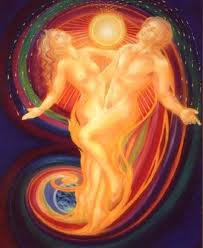 OK, so few enter the world of Tantra looking for enlightenment, or at least few enter knowing that they are looking for enlightenment. Most come for better sex, to find intimacy or to improve relationships. But perhaps all of these longings are ultimately for the same thing, a sort of deep inner urge for something deeper, something higher.
OK, so few enter the world of Tantra looking for enlightenment, or at least few enter knowing that they are looking for enlightenment. Most come for better sex, to find intimacy or to improve relationships. But perhaps all of these longings are ultimately for the same thing, a sort of deep inner urge for something deeper, something higher.
After all, perhaps the search for extraordinary sexual experience is also the search for death…not the physical kind, but a certain death into the beyond. Beyond everyday reality, beyond everyday concerns and worries, beyond thought…beyond mind…is that not also the definition of meditation?
The French, in their wisdom, call orgasm le petit mort, the “little death”. Perhaps an insight into the spiritual nature of sex, the glimpse of enlightenment through sex.
And intimacy… the craving to connect, to open with another. The fuel behind relationships. Is this not also the search for love? And what is love, if not a dissolving beyond self…is that not also the definition of meditation?
The great thing about Tantra is that if you step into it because you want to be a chick-magnet or score a husband, it doesn’t matter…it takes you towards enlightenment anyway, towards awakening, towards source. That is the magic of Tantra.
Sometimes I reckon it is better not to think about enlightenment…it is not worth getting too heady about, and one is bound to fall into confusion or delusion. Because one is trying to think the unthinkable, and this can lead to either feeling like you will never ever get “it”, or get all muddled about what it’s all about.
Even worse, thinking about it all may lead to a case of “doing enlightenment”, walking around pretending to be in the moment, acting out being non-attached…if you find yourself walking with your head above everyone else’s you are bound to have fallen into this delusion. Because, after all, enlightenment is about recognising our Oneness, not our superiority!
 In Tantra it is possible to cultivate states in which one experiences dissolving into something greater than self, a state of ecstasy. In such a state a realization occurs, a sort of remembering who we really are. Or perhaps a forgetting of who we are not! Such states are delightful, and help to loosen the hold of the “illusion” that we are a separate self.
In Tantra it is possible to cultivate states in which one experiences dissolving into something greater than self, a state of ecstasy. In such a state a realization occurs, a sort of remembering who we really are. Or perhaps a forgetting of who we are not! Such states are delightful, and help to loosen the hold of the “illusion” that we are a separate self.
However, an experience is an experience, the very definition of it is that it comes and it goes. So at some point the ecstasy passes and we may return to selfhood once more. The great thing is that the belief and certainty that you once had about your own identity becomes softened each time you crack the shell open. You can open to new possibilities…maybe you are part of a universal life, an interconnected web, a oneness after all.
A pitfall is to get over-attached to the experiences, and to mistake them for something you are trying to attain. Then you become addicted to ecstasy, grasping over and over to repeat them or to cultivate a new experience. Experience can be seen as a mirror; it helps us to know who we are. But we do not need to hold onto the actual mirror, we do not need to cling to the experience. Tantra teaches us the art of experiencing totally and then letting go.
We sometimes carry the unquestioned assumption that enlightenment is an experience that will someday start and never end. We imagine one day we wake up and fireworks are going off, and we will forever see life though rainbow glasses. But if your enlightenment was a permanent mind-blowing ecstasy, the type that you generate from certain practices, it would be very hard to get the laundry done.
We often hear that enlightenment is very simple, ordinary even. Yet it is not the “ordinary” of mainstream existence, else we would not be seeking something else… perhaps this kind of ordinary is more the kind of the all-knowing twinkle in the eye. Nothing to shout about; a deep resting in what is, a light-hearted humourful way to play in life…knowing all is not what it appears to be. Ordinary but not ordinary.
How do we live in this way? The key is integration. The art of integrating extraordinary experiences into one’s everydayness. The fusion of the profound and the profane. In Tao and Tibetan Tantra they speak of this as the dissolving of all duality into the core, into the center. Yes, even ecstasy and ordinariness can meet, and dissolve back into the core.
This core, or center, is often thought of as the Source Point. The part of us that is Source; our un-changing presence. This might sound profound, but you can think of it as the part of you that was the same when you were 3, same when you were 21…and will be the same when you are 101. It is the witness that watches life unfolding. In Tantra we use strong experiences to build a deeper connection to this witness-consciousness. Experiences are depicted as Shakti dancing, and the witness is Shiva watching.
Some non-tantric paths of enlightenment encourage the recognition and resting-in of this witness-consciousness at the expense of Shakti, of experience. This is the ascetic path…denying experience in order to fall into presence, in a way it is denying life in order to know death. Tantra is not ascetic. Tantra says yes to it all. Tantra takes the life and the death and finds out how they meet.
So there is quality of enlightenment within Tantra that is, as Osho says “total”. When one chooses to open to all flows of energy, emotion and experience (shakti), one becomes so total with life that one dissolves into it. There is no separation between you and life. You are life. And yet you are also the death beyond all life. And you are the source of all life and death.
And you thought you were signing up for better sex and easy relationships??!! Welcome to Tantra!